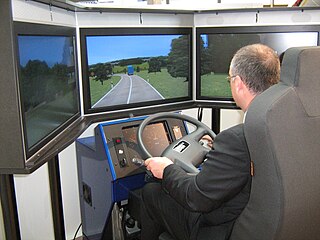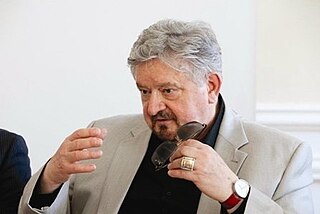Related Research Articles

A simulation is an approximate imitation of the operation of a process or system; that represents its operation over time.

The Michigan Terminal System (MTS) is one of the first time-sharing computer operating systems. Developed in 1967 at the University of Michigan for use on IBM S/360-67, S/370 and compatible mainframe computers, it was developed and used by a consortium of eight universities in the United States, Canada, and the United Kingdom over a period of 33 years.

Computer simulation is the process of mathematical modelling, performed on a computer, which is designed to predict the behaviour of or the outcome of a real-world or physical system. Since they allow to check the reliability of chosen mathematical models, computer simulations have become a useful tool for the mathematical modeling of many natural systems in physics, astrophysics, climatology, chemistry, biology and manufacturing, as well as human systems in economics, psychology, social science, health care and engineering. Simulation of a system is represented as the running of the system's model. It can be used to explore and gain new insights into new technology and to estimate the performance of systems too complex for analytical solutions.
General Purpose Simulation System (GPSS) is a discrete time simulation general-purpose programming language, where a simulation clock advances in discrete steps. A system is modelled as transactions enter the system and are passed from one service to another. It is used primarily as a process flow oriented simulation language; this is particularly well-suited for problems such as a factory.

Anatol Rapoport was an American mathematical psychologist. He contributed to general systems theory, to mathematical biology and to the mathematical modeling of social interaction and stochastic models of contagion.
Computational science, also known as scientific computing or scientific computation (SC), is a rapidly growing field that uses advanced computing capabilities to understand and solve complex problems. It is an area of science which spans many disciplines, but at its core, it involves the development of models and simulations to understand natural systems.
In computer network research, network simulation is a technique whereby a software program models the behavior of a network by calculating the interaction between the different network entities. Most simulators use discrete event simulation - the modeling of systems in which state variables change at discrete points in time. The behavior of the network and the various applications and services it supports can then be observed in a test lab; various attributes of the environment can also be modified in a controlled manner to assess how the network / protocols would behave under different conditions.

Mesh generation is the practice of creating a mesh, a subdivision of a continuous geometric space into discrete geometric and topological cells. Often these cells form a simplicial complex. Usually the cells partition the geometric input domain. Mesh cells are used as discrete local approximations of the larger domain. Meshes are created by computer algorithms, often with human guidance through a GUI, depending on the complexity of the domain and the type of mesh desired. The goal is to create a mesh that accurately captures the input domain geometry, with high-quality (well-shaped) cells, and without so many cells as to make subsequent calculations intractable. The mesh should also be fine in areas that are important for the subsequent calculations.

Arena is a discrete event simulation and automation software developed by Systems Modeling and acquired by Rockwell Automation in 2000. It uses the SIMAN processor and simulation language. As of 2020, it is in version 16. It has been suggested that Arena may join other Rockwell software packages under the "FactoryTalk" brand.
A discrete-event simulation (DES) models the operation of a system as a (discrete) sequence of events in time. Each event occurs at a particular instant in time and marks a change of state in the system. Between consecutive events, no change in the system is assumed to occur; thus the simulation time can directly jump to the occurrence time of the next event, which is called next-event time progression.

A. Alan B. Pritsker was an American engineer, pioneer in the field of Operations research, and one of the founders of the field of computer simulation. Over the course of a fifty-five-year career, he made numerous contributions to the field of simulation and to the larger fields of industrial engineering and operations research.
Simulation software is based on the process of modeling a real phenomenon with a set of mathematical formulas. It is, essentially, a program that allows the user to observe an operation through simulation without actually performing that operation. Simulation software is used widely to design equipment so that the final product will be as close to design specs as possible without expensive in process modification. Simulation software with real-time response is often used in gaming, but it also has important industrial applications. When the penalty for improper operation is costly, such as airplane pilots, nuclear power plant operators, or chemical plant operators, a mock up of the actual control panel is connected to a real-time simulation of the physical response, giving valuable training experience without fear of a disastrous outcome.
The IEEE Nikola Tesla Award is a Technical Field Award given annually to an individual or team that has made an outstanding contribution to the generation or utilization of electric power. It is awarded by the Board of Directors of the IEEE. The award is named in honor of Nikola Tesla. This award may be presented to an individual or a team.

AnyLogic is a multimethod simulation modeling tool developed by The AnyLogic Company. It supports agent-based, discrete event, and system dynamics simulation methodologies. AnyLogic is a cross-platform simulation software designed exclusively for Windows, macOS and Linux.
DYNAMO is a historically important simulation language and accompanying graphical notation developed within the system dynamics analytical framework. It was originally for industrial dynamics but was soon extended to other applications, including population and resource studies and urban planning.
Lee W. Schruben is an American educator, engineer and serves as the Professor and Past Chair, Department of Industrial Engineering and Operations Research College of Engineering, University of California at Berkeley. He is the former Andrew Schultz, Jr. Professor (1976–1998), Sibley College of Engineering, Cornell University, Department of Operations Research. Professor Schruben took his Bachelor of Science at Cornell’s engineering college in 1968, his Master of Science at the University of North Carolina in 1973 and his doctorate at Yale University in 1974.
Pieter Johannes Mosterman is Chief Research Scientist and Director of the MathWorks Advanced Research & Technology Office (MARTO) at MathWorks in Natick, Massachusetts. He also holds an Adjunct Professorship at the School of Computer Science at McGill University in Montreal, Canada. His primary research interests are in Computer Automated Multiparadigm Modeling with principal applications in design automation, training systems, and fault detection, isolation, and reconfiguration.
Bernard P. Zeigler is a Canadian engineer, and emeritus professor at the University of Arizona, known for inventing Discrete Event System Specification (DEVS) in 1976.

Milan Zeleny (born January 22, 1942) is an American economist of Czech origin, currently a Professor of Management Systems at Fordham University, New York City. He has done research in the field of decision-making, productivity, knowledge management, and business economics. Zeleny is also a visiting professor at the Tomas Bata University in Zlín, Czech Republic, and has been Academic Vice Dean and Professor at Xidian University in Xi’an, China. He is a Distinguished Visiting Professor at Fu Jen University in Taipei in 2006, at the Indian Institute of Technology in Kanpur in 2007, and at IBMEC in Rio de Janeiro in 2009–10. For many years he has lectured at the Faculty of Architecture, University of Naples.

Micro Saint Sharp is a general purpose discrete-event simulation and human performance modeling software tool developed by Alion Science and Technology. It is developed using C# and the .NET framework. Micro Saint Sharp allows users to create discrete-event simulations as visual task networks with logic defined using the C# programming language.
References
- ↑ Bratley, Paul, Bennett L. Fox, and Linus E. Schrage. A guide to simulation. Vol. 2. New York: Springer-Verlag, 1983.
- ↑ Pritsker, A. Alan B. Introduction to stimulation and Slam II. (1986).
- 1 2 3 4 5 THOMAS J. SCHRIBER : Professor of Technology and Operations, Stephen M. Ross School of Business, The University of Michigan, May 2014